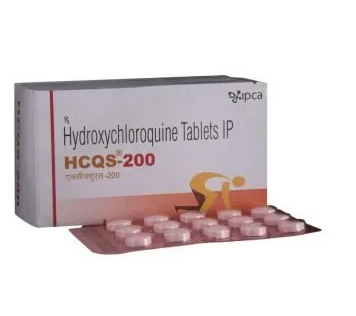Hydroxychloroquine is primarily used to treat certain autoimmune diseases and to prevent and treat malaria. Here are its main uses:
- Malaria: Hydroxychloroquine Tablet is used as an antimalarial drug to prevent and treat malaria caused by certain species of parasites. It works by interfering with the growth and survival of the malaria parasite within the red blood cells.
- Autoimmune Diseases: Hydroxychloroquine is also used to treat various autoimmune diseases, particularly those that affect the joints and skin. Some examples of these conditions include:
- Rheumatoid Arthritis: It can help reduce inflammation and pain associated with rheumatoid arthritis.
- Systemic Lupus Erythematosus (SLE): It is used to manage symptoms of lupus, including joint pain, skin rashes, and fatigue.
- Sjögren’s Syndrome: This autoimmune disorder primarily affects the glands that produce moisture in the body, leading to dry eyes and mouth. Hydroxychloroquine can help alleviate these symptoms.
It’s important to note that the medical landscape can change over time, and new information or uses for drugs can emerge. Additionally, as of my last update, hydroxychloroquine gained attention due to its possible use in treating COVID-19, but its efficacy and safety for this purpose were still being studied and debated within the medical community.
For the most current and accurate information, I recommend consulting a medical professional or referring to the latest medical resources.
How long can you safely take hydroxychloroquine?
The duration for which hydroxychloroquine can be safely taken depends on the specific medical condition being treated, the individual patient’s response to the medication, and potential risks and benefits that need to be considered. If hydroxychloroquine is being used to treat malaria, the duration of treatment would be determined by the healthcare provider based on the type of malaria and the region where the person is traveling.
When hydroxychloroquine is used to treat autoimmune diseases like rheumatoid arthritis or systemic lupus erythematosus, it’s generally considered a long-term treatment option. Many patients with these conditions may take hydroxychloroquine for years under the supervision of their healthcare provider. In these cases, regular monitoring is important to assess the medication’s effectiveness and any potential side effects.
It’s important to note that hydroxychloroquine can have side effects, some of which might become more significant with prolonged use. Regular monitoring of eye health is particularly important, as hydroxychloroquine has the potential to cause retinal toxicity in some individuals. This is why routine eye examinations are recommended for individuals taking hydroxychloroquine for an extended period.
If you have been prescribed hydroxychloroquine, it’s crucial to follow your healthcare provider’s instructions closely and attend all recommended check-ups. If you have concerns about the duration of your treatment or potential side effects, discuss them with your healthcare provider. They will be able to provide you with personalized guidance based on your medical history and current condition. If you are thinking to buy this tablet then visit to dosepharmacy.
Is hydroxychloroquine safe to take daily?
Hydroxychloroquine can be safe to take daily under the supervision of a qualified healthcare professional, especially when prescribed for conditions like autoimmune diseases (e.g., rheumatoid arthritis, systemic lupus erythematosus) for which it is commonly used. However, as with any medication, there are potential risks and considerations that need to be taken into account:
- Dosage: The appropriate dosage of hydroxychloroquine can vary based on the medical condition being treated. Your healthcare provider will determine the correct dosage for your specific needs.
- Monitoring: Regular monitoring is important to assess the medication’s effectiveness and any potential side effects. This includes routine eye examinations to check for signs of retinal toxicity, which is a known side effect of long-term hydroxychloroquine use.
- Side Effects: While hydroxychloroquine is generally well-tolerated, it can have side effects. These can include gastrointestinal symptoms, skin rashes, and, as mentioned earlier, potential retinal toxicity. Your healthcare provider will discuss these potential side effects with you and monitor your health accordingly.
- Drug Interactions: Hydroxychloroquine can interact with other medications you may be taking, potentially leading to adverse effects or reduced effectiveness. It’s important to inform your healthcare provider of all the medications you are currently taking, including over-the-counter drugs and supplements.
- Individual Factors: Factors such as your overall health, medical history, and any pre-existing conditions will also influence whether hydroxychloroquine is safe for you to take daily.
It’s crucial to only take hydroxychloroquine under the guidance of a qualified healthcare professional who can assess your specific situation, monitor your health, and provide you with appropriate recommendations. If you have any concerns or questions about the safety of taking hydroxychloroquine daily, discuss them with your healthcare provider.









+ There are no comments
Add yours